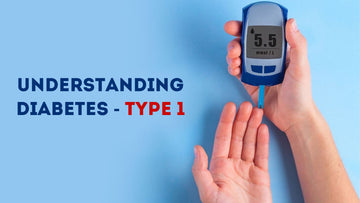
Diabetes is a condition that occurs when your blood glucose, also known as blood sugar, is abnormally high. Blood glucose is your primary source of energy and is obtained from the foods you consume. Insulin, a hormone produced by the pancreas, aids in the transport of glucose from food into your cells for use as energy. Sometimes your body does not produce enough or any insulin, or it does not use insulin effectively. Glucose then remains in your blood rather than reaching your cells.
What Exactly Is Type 1 Diabetes?
When you have Type 1 Diabetes, your pancreas either does not produce insulin or produces very little insulin. Insulin facilitates the entry of blood sugar into cells in your body for use as energy. Without insulin, blood sugar cannot enter cells and accumulates in the bloodstream. High blood sugar is harmful to the body and contributes to many of the symptoms and complications associated with diabetes.
Type 1 diabetes was previously known as insulin-dependent or juvenile diabetes. It typically manifests in children, teenagers, and young adults, but it can occur at any age. Type 1 diabetes is less common than Type 2 Diabetes; approximately 5-10% of diabetics have type 1. No one knows how to prevent type 1 diabetes at the moment, but it can be successfully treated by:
Following Your Doctor's Advice On How To Live A Healthy Lifestyle.
- Keeping blood sugar in check.
- Having regular health examinations.
- Obtaining diabetes self-management education and assistance.
- If a child has type 1 diabetes, especially if they are young, you will be in charge of their diabetes care on a daily basis.
- Daily care will include serving nutritious foods, administering insulin injections, and monitoring and treating Hypoglycemia (Low Blood Sugar).
What Is the Cause of Type 1 Diabetes?
An autoimmune reaction is thought to be the cause of type 1 diabetes the body attacks itself by mistake. This reaction destroys the pancreatic beta cells, which produce insulin. This can take months or years before any symptoms appear.
Certain genes make some people more likely to develop type 1 diabetes. Even if they have the genes, many of them will not develop type 1 diabetes. A virus or other environmental trigger may also play a role in the development of type 1 diabetes. Type 1 diabetes is not caused by diet or lifestyle choices.
Risk Factors and Symptoms
Type 1 diabetes symptoms may not be noticed for months or years. Type 1 diabetes symptoms can appear in as little as a few weeks or months. When symptoms emerge, they can be severe.
Some symptoms of type 1 diabetes are similar to those of other medical conditions. Don't make a guess! If you suspect you have type 1 diabetes, consult your doctor and have your blood sugar levels checked. Diabetes, if left untreated, can cause serious, even fatal, health problems.
The risk factors for type 1 diabetes are not as clear as they are for type 2 diabetes and prediabetes. However, research indicates that family history plays a role.
Diabetes Type 1 Testing
A simple blood test will reveal whether or not you have diabetes. Follow up at a clinic or doctor's office if you were tested at a health fair or pharmacy. This way, you can be certain that the results are correct.
Your blood may be tested for autoantibodies if your doctor suspects you have type 1 diabetes. These substances indicate that your body is attacking itself and are frequently found in type 1 diabetes but not in type 2 diabetes. You could also have your urine tested for ketones. When your body burns fat for energy, it produces ketones. The presence of ketones in your urine indicates that you have type 1 diabetes rather than type 2.
Diabetes Management
In addition, seek assistance and support from your family, doctors, experts, etc, diabetes management can be difficult, but anything you do to improve your health is worthwhile!
If you have type 1 diabetes, you must take insulin shots or wear an insulin pump on a daily basis. Insulin is required to control blood sugar levels and provide energy to the body. Insulin cannot be taken as a pill. This is due to the fact that the acid in your stomach would destroy it before it could enter your bloodstream. Your doctor will work with you to determine the best type and dosage of insulin for you.
You'll also need to check your blood sugar levels on a regular basis. Inquire with your doctor about how frequently you should check it and what your target blood sugar levels should be. Keeping your blood sugar levels as close to regular as possible will help you avoid or postpone diabetes complications.
Stress is a natural part of life, but it can make diabetes management more difficult. Managing your blood sugar levels as well as dealing with daily diabetes care can be difficult. Regular physical activity, adequate sleep, and relaxation exercises can all help. Discuss these and other stress-management strategies with your doctor and diabetes educator.
Healthy Lifestyle Habits Are Also Very Important:
- Making nutritious food choices
- Controlling your blood pressure through physical activity
- Keeping your cholesterol under control
- Maintain regular contact with your healthcare team.
Diabetic Ketoacidosis & Hypoglycemia
These two conditions are common diabetes complications that you must be aware of. Consult your doctor for detailed instructions. You might want to bring a family member with you to the appointment so they can learn the procedures as well.
- Hypoglycemia (Low Blood Sugar) can occur quickly and must be treated as soon as possible. It is frequently caused by:
- There is too much insulin.
- Too long between meals or snacks.
- Not getting enough nutrients.
- Increasing physical activity.
Consult your doctor if you have low blood sugar more than once a week. It is possible that your treatment plan will need to be modified.
- Diabetic Ketoacidosis (DKA) is a serious diabetes complication that can be fatal. DKA occurs when there is insufficient insulin to allow blood sugar into your cells. DKA is caused by extremely high blood sugar levels and low insulin levels. Illness and missed insulin shots are the two most common causes. Consult your doctor to ensure you understand how to prevent and treat DKA.
Learn More About Diabetes
Meeting with a diabetes educator is an excellent way to get advice and support, including how to:
- Create and follow a healthy eating and activity plan.
- Maintain a record of your blood sugar levels.
- Understand the symptoms of high or low blood sugar and what to do about it.
- Use a syringe, pen, or pump to administer insulin to yourself.
- Keep an eye on your feet, skin, and looks to detect problems early.
- Purchase diabetes supplies and properly store them.
- Stress management and diabetes care on a daily basis
Inquire with your doctor about diabetes self-management education and support services, as well as a referral to a diabetes educator. You can also use this national directory external icon to find a list of programs in your area.
AADAR’s Jeevani a's one of the best-selling products which prevent diabetes at an early stage and also helps infected ones to manage it naturally. AADAR Jeevani is available in both Capsule and Powdered form which can be taken at your convenience.
With AADAR we always want our consumers to have better lifestyle choices. Be it diabetes or any other disease we want customers to cure from the roots AADAR always wants people to have a simple principle of lifestyle with health that paves a way for disease-free life and just makes it more worth living.
We have Health Experts who can easily connect with you and discuss your sexual concerns. You can consult your family doctor first to get the most accurate diagnosis, or you can contact our Health Expert or connect with us at +919867667699.




I stumbled across a comment while scouring the internet. I am suffering from erectile dysfunction, which was the same situation i found on the post , i ordered mine and same with me today am cured ,if you also need his assistance , You meant go through his website: https://bubaherbalmiraclem.wixsite.com/website Or reach via mail: buba.herbalmiraclemedicine@gmail.com or his Facebook Page ;https://www.facebook.com/profile.php?id=61559577240930 . AND THANK ME LATER